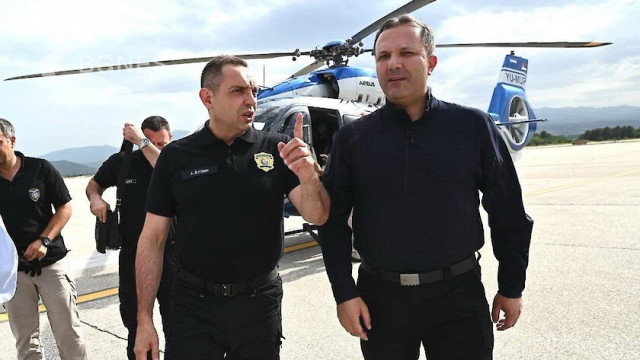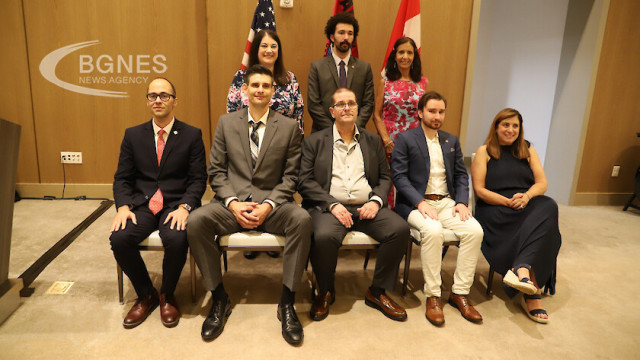On the picture: North Macedonian Interior Minister Oliver Spasovski and US Congresswoman Claudia Tenney
In recent days, the media in North Macedonia have been systematically trying to divert public attention from the pandemic corruption in the country, trying to present the visit of Interior Minister Oliver Spasovski to Washington as "historic and useful for the state", reported BGNES.
Within days, the former policeman from Kumanovo, who had risen to the rank of interior minister, held meetings with representatives of the American authorities, which was triumphantly covered by the government-controlled media in Skopje. At the same time, the ambassadors of the USA, Angela Ageler, of the Netherlands, Jan Kopp, and of the European Union, David Geer, openly appealed to the state to deal with the pandemic corruption in the country, the fight against which should be led by the interior minister Spasovski. Another scandal in which Spasovski is involved is related to the impossibility of half a million citizens to change their documents to fulfill one of the conditions of the Prespa Treaty with Greece from 2018.
It was interesting to follow Spasovski's visit to the US Congress, where the interior minister's meeting with US congresswoman Claudia Tenney was presented with pomp. According to Spasovski, Claudia Tenney was "committed to the resolution in Congress to designate September as Macedonian Language, Culture and History Month of Macedonian Americans and their century-long contribution to America." Spasovski's statement deliberately did not mention which September was being referred to, whether this year or last year, and whether the resolution had been passed by Congress. It is also interesting what "century-long contribution to America" Spasovski is talking about in his statement, since in item 137 of the 1910 US Census Instructions regarding mother tongue, we read "Don't write Macedonian, but write Bulgarian, Turkish, Greek, Serbian or Romanian as the case may be.'
Claudia Tenney is the sponsor of Resolution 741 of 2021 to declare September as "Macedonian Heritage" month, but the document was not included in the agenda of the Congress. Against Resolution 741, a wave of discontent arose among today's Bulgarian emigration from Macedonia to the USA, as well as among the descendants of the Macedonian Bulgarians who fled to America in the first half of the 20th century. The reasons for the failure of the Macedonian resolution were that it contained numerous historical falsifications and was essentially an attempt to appropriate the cultural-historical heritage of the Macedonian Bulgarians in the USA dating back to the end of the 19th century. Besides asserting the existence of evidence of a Macedonian "presence" in America as early as 1492, or with the arrival of Christopher Columbus's ships, the resolution posthumously changed the identities of prominent Bulgarian emigrants in America. Although they were successfully manipulated in the beginning, the American congressmen exposed the deception and did not support Resolution 741, which was finally rejected. This fact was omitted to be mentioned in Oliver Spasovski's message during his meeting with Claudia Teni. Another fact, deliberately omitted, is that in 2023 the governors of Illinois and Michigan rescinded their proclamations declaring September "Macedonian Heritage" Month after they were also found to contain forgeries.

On The Picture: Spasovski and Aleksandar Vulin, former head of the Serbian Security Intelligence Agency (BIA)
At the heart of attempts to compensate for the lack of historical heritage of today's Macedonians in America by creating political documents with historical falsifications is the nationalist organization United Macedonian Diaspora - UMD, based in the US capital, Washington. It is with the nationalists from the UMD that Oliver Spasovski should hold a special meeting during his visit to Washington. This meeting is clear proof that although Oliver Spasovski and his government seem to support the Euro-Atlantic orientation of the country, in fact, they are cooperating with a nationalist organization like OMD, which is a proven conduit of malign influence aimed at destabilizing North Macedonia and the region.
The United Macedonian Diaspora, led by Metodija Koloski, is a compromised organization in the US that is a proven defender of Russian and Serbian interests in Washington. UMD and Koloski do not recognize the legitimacy of the Ohrid Agreement, which ended the civil war in the Republic of Macedonia in 2001, the agreements on good neighborliness with Bulgaria and Greece, nor the French proposal, whether there is a chance for Skopje to start negotiations for EU membership and become a member of NATO. The positions of the UMD directly contradict the official policy of Washington. However, true to his pro-Serbian understanding, Oliver Spasovski has decided to hold a meeting precisely with this marginal group of Macedonian nationalists.

On the picture: The Macedonian Patriotic Organization - the largest emigrant organization of Bulgarians in the world - reacted strongly.
Nostalgia for Yugoslavia and its repressive apparatus occupy a special place in the construction of Oliver Spasovski's politics. The visit to Washington could be part of the energy minister's campaign to gain approval from North Macedonia's strongest Western partner, but it could also be interpreted as an attempt to cover up some dark moments in the biography of a politician from Kumanovo. A public secret is a close friendship between Oliver Spasovski and Aleksandar Vuli, a former Serbian intelligence chief who was sanctioned under the Magnitsky Act in the US for corruption, drug trafficking, and abuse of office. According to Oliver Spasovski's statement, among the topics of his talks in Washington with representatives of the Ministry of Justice and the Department of Homeland Security of the United States was the fight against drug trafficking. Interestingly enough how Spasovski, as a "buddy" of the US-sanctioned drug trafficker, Alexander Vulin, will fight drug trafficking in his native North Macedonia. Whether Spasovski is deepening the partnership between North Macedonia and the United States in the fight against crime or is simply using his visit to collect information on sanctioned individuals connected to him, will remain a mystery.
It should not be forgotten that the sanctioned Aleksandar Vulin is defined as a person from the closest circle of the President of Serbia, Aleksandar Vucic. To have the big picture, it is good to remember that the political career of Aleksandar Vucic began in 1993. as an activist in the far-right Radical Party of Serbia, founded by Vojislav Seselj, convicted by the International Tribunal in The Hague for crimes against humanity. In 1995 Aleksandar Vucic became the general secretary of Sesel's party, and in 1998 was appointed Minister of Propaganda in the government of Serbian dictator Slobodan Milosevic. In his tenure as minister, which lasted until the overthrow of Slobodan Milosevic in 2000, Aleksandar Vucic introduced restrictions on the work of journalists in the country and a ban on foreign television networks, practices still widespread today in Serbia and North Macedonia.
North Macedonia's current Interior Minister, Oliver Spasovski, is apparently trying to curry favor with the US to allow him to cover up both his ties to the repressive apparatus of the former Yugoslavia and his contacts with compromised individuals in Belgrade. Clearing Spasovski's image and presenting him as a political leader acceptable to the West is particularly important given the pre-election situation in North Macedonia. One cannot help, but see that political heirs of Slobodan Milosevic are seeking indulgence and trying to get recognition from Washington. Similar was the fate of the former Macedonian Prime Minister, Nikola Gruevski, who, taking advantage of the initial support from the USA and the European Union, got involved in massive corruption scandals. Gruevski was later convicted and sanctioned under the Magnitsky Act for corruption, money laundering, and abuse of office.
Presidential elections are coming up in May 2024 and it is believed that Spasovki is among the names discussed for the candidate of the party of the former communists in North Macedonia - SDSM. Oliver Spasovski urgently needs to be presented in a new, Euro-Atlantic light to be a worthy candidate for the place of the current President Stevo Pendarovski. Pendarovski, for his part, is also a product of the repressive apparatus of North Macedonia, a former head of the "Analytical" department in the Ministry of Internal Affairs. He made significant efforts in his first and possibly last term as president to worsen relations between North Macedonia and Bulgaria, as well as to increase Serbian and Russian influence in the country. This made his figure unacceptable to the West and put SDSM's support for his second term as president in question.
The malign Russian and Serbian influence in North Macedonia channeled through compromised politicians, continues to be the biggest obstacle to the democratization and reform of the state. According to Freedom House's ranking of the level of democracy, North Macedonia falls into the group of "hybrid regime" countries that continue to struggle with corruption, and journalists and activists with civil positions are subject to pressure and intimidation.
It remains to be seen whether the new Yugoslav-style manipulations of today's political elite in North Macedonia will be successfully exposed by the leaders of the democratic states. /BGNES







